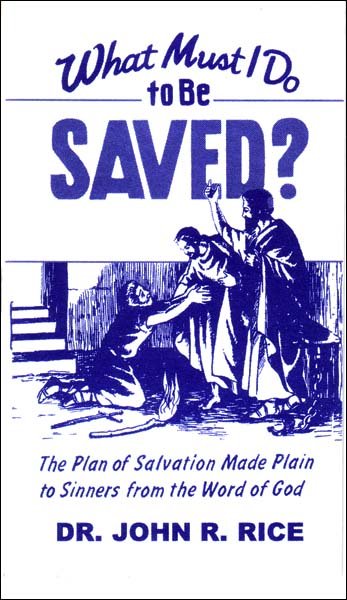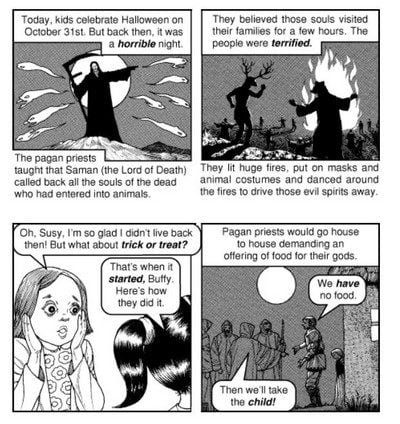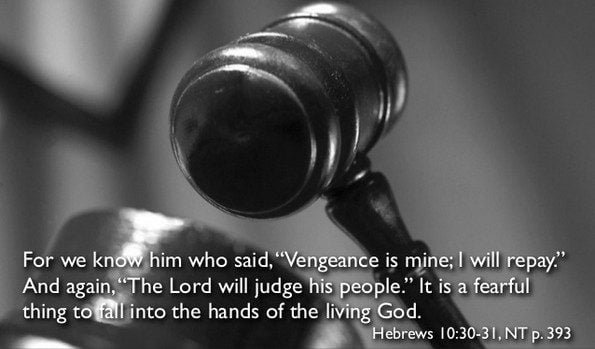
Evangelicals believe all humans are born sinners, alienated from God, and in need of salvation through the merit and work of Jesus Christ. Jesus died on a Roman cross and rose from the dead three days later to save sinners from their sins. Evangelicals believe in the exclusivity of the Christian gospel; that there is one true God; that there is one true path of salvation/redemption/conversion; that it is only through Jesus Christ that sinners can have their sins forgiven; that sinners must repent of their sins and put their faith and trust in Jesus alone to be saved/converted/born again. (I recognize that what I have written above trips over all sorts of beliefs Evangelicals are fond of arguing over. My goal was to provide a general definition of what it means to be saved without dealing with the doctrines Arminians and Calvinists have been fighting about for centuries.)
Evangelicals believe that getting saved requires a supernatural act by the Christian God. No one can get saved when he or she wants to or on their own terms. It is God alone who does the saving. Granted, if you listen to Evangelical preachers long enough, you will likely conclude that your salvation is up to you; that all you need to do is walk the aisle/pray the sinner’s prayer/sign a card or one of the numerous other acts of volition these men of God say is necessary for your conversion. Quite frankly, what Evangelical preachers call the “simple gospel” is, in fact, quite confusing and contradictory. (Please see Can Anyone Really Know They Are Saved?) Every sect believes its soteriology is right; that following its plan of salvation is the only way to get saved and gain entrance into Heaven after death. Instead of spending thousands of words parsing the allegedly supernatural aspects of Christian salvation, I want to spend my time in this post delineating seven visible, verifiable reasons people get saved.
Geography
One of the most enlightening things for me as I restudied the claims of Christians was to look at a map of the world’s religions and realize that geography plays a big part in why a person worships a particular deity. I grew up in a culture where the world’s religions were neatly and precisely divided into two groups: True Christianity® and false religions. The same went for all the inhabitants of earth. Either they were saved or lost. Either they were Christians headed for Heaven or unbelievers/heathens headed for Hell. I was taught from my youth up that only a small percentage of people were True Christians®; that American Evangelicals were duty-bound to send gospel-preaching missionaries to every non-Christian people group on earth. Jesus commanded his disciples to “go into all the world and preach the gospel to every creature.” Billions of people did not know Jesus as their Lord and Savior. Saving the world required sending missionaries to the ends of the earth. I later learned that the “ends of the earth” primarily meant cultures that spoke English and would provide missionaries with a decent standard of living. Most missionaries end up going to countries where Christianity is already firmly established. Of course, these countries didn’t have the right kind of Christianity, so it was up to Evangelical churches and their missionaries to bring True Christianity® to unsaved Christians.
Viewing a map of the world’s religions was one of those moments for me that caused me to reconsider what I thought about religion itself. The map showed me that the world’s countries had predominant religions. It also revealed to me that states and regions can have predominant religions too. I concluded that one of the reasons that most people get saved is because of where they live. The United States is a Christian nation. Is it any surprise that most of its inhabitants are Christians? It’s all about geography.
Family
Another reason people get saved is family. I became a Christian because I was born in a Christian nation to Evangelical parents who indoctrinated and conditioned me at an early age in the one true faith. I attended Evangelical churches for the first fifty years of my life. I studied for the ministry at an Independent Fundamentalist Baptist (IFB) college. While there, I married the daughter of an IFB pastor. We left college and spent the next twenty-five years pastoring Evangelical churches. Much like our parents did, my wife and I indoctrinated our six children in the one true faith, passing on to them the family deity. It seems to me, then, that where I was born and who my family was were largely the reasons I became an Evangelical Christian and spent much of my adult life trying to evangelize people I deemed “lost.”
Personal Crisis
Another reason people get saved is having a personal crisis. There’s nothing that can get your attention like a crisis. Countless Evangelicals trace their salvation back to a divorce, serious illness or debility, loss of employment, death of a spouse, death of a child, loss of their home due to fire or flood, or countless other tragedies we humans face. It should not be surprising that preachers use such crises to evangelize people. People are emotionally vulnerable and sensitive during times of loss. What they need, Evangelical preachers say, is Jesus. Jesus becomes the cure for whatever ails people. That is why many Evangelical preachers evangelize hurting people during funeral services. What better time to preach the gospel than when people are weeping and wailing over the death of a loved one? Strike while the proverbial iron is hot, right?
Addiction
Yet another reason people get saved is addiction. Drug and alcohol addiction causes all sorts of heartache and damage. Evangelical preachers tell addicts that Jesus is the only “fix” for their addictions. And sure enough, scores of addicts end up finding victory over drugs and/or alcohol through getting saved. A religion need not be true for it to provide help and value to people. (Please see Never Underestimate the Power of Jesus.) I know numerous Evangelicals who were, at one time, drunks and drug addicts. These people reached a crisis point, and, having nowhere else to turn, they turned to Jesus. I know some atheists have a hard time understanding this, but the fact remains that the dead Jesus has helped lots of people kick their habits. People really, really, really believe Jesus delivered them, and from a psychological perspective, it’s clear he has. Whatever works, right?
Fear
Dr. Larry Dixon, a former Evangelical professor of theology at Columbia International University Seminary and School of Missions in Columbia, South Carolina, said that one of the reasons he got saved was fear. In a multipart review of Dr. David Bentley Hart’s article titled, Why Do People Believe in Hell? Dixon wrote:
This is a very personal issue for me, mostly because I got saved as a result of being afraid of going to hell. If hell doesn’t exist, or if it is something quite different than Christians have believed (like, the purging flames of God universally applied), then I got saved under false pretenses.
Dixon is not alone in his admission that one of the reasons he got saved was fear. For those of us who grew up in Evangelical churches hearing sermons about God’s judgment, Hell, the Lake of Fire, and the soon return of Jesus to destroy the earth, fear was a common motivator for salvation. The Bible says in Hebrews 10:31: It is a fearful thing to fall into the hands of the living God. On July 8, 1741, famed revivalist Jonathan Edwards preached a sermon titled Sinners in the Hands of an Angry God. Edwards stated:
O sinner! Consider the fearful danger you are in: it is a great furnace of wrath, a wide and bottomless pit, full of the fire of wrath, that you are held over in the hand of that God, whose wrath is provoked and incensed as much against you, as against many of the damned in hell. You hang by a slender thread, with the flames of divine wrath flashing about it, and ready every moment to singe it, and burn it asunder; and you have no interest in any Mediator, and nothing to lay hold of to save yourself, nothing to keep off the flames of wrath, nothing of your own, nothing that you ever have done, nothing that you can do, to induce God to spare you one moment.
….
The God that holds you over the pit of hell, much as one holds a spider, or some loathsome insect over the fire, abhors you, and is dreadfully provoked: his wrath towards you burns like fire; he looks upon you as worthy of nothing else, but to be cast into the fire; he is of purer eyes than to bear to have you in his sight; you are ten thousand times more abominable in his eyes, than the most hateful venomous serpent is in ours. You have offended him infinitely more than ever a stubborn rebel did his prince; and yet it is nothing but his hand that holds you from falling into the fire every moment. It is to be ascribed to nothing else, that you did not go to hell the last night; that you were suffered to awake again in this world, after you closed your eyes to sleep. And there is no other reason to be given, why you have not dropped into hell since you arose in the morning, but that God’s hand has held you up.
….
How dreadful is the state of those that are daily and hourly in the danger of this great wrath and infinite misery! But this is the dismal case of every soul in this congregation that has not been born again, however moral and strict, sober and religious, they may otherwise be. Oh that you would consider it, whether you be young or old! There is reason to think, that there are many in this congregation now hearing this discourse, that will actually be the subjects of this very misery to all eternity. We know not who they are, or in what seats they sit, or what thoughts they now have. It may be they are now at ease, and hear all these things without much disturbance, and are now flattering themselves that they are not the persons, promising themselves that they shall escape. If we knew that there was one person, and but one, in the whole congregation, that was to be the subject of this misery, what an awful thing would it be to think of! If we knew who it was, what an awful sight would it be to see such a person! How might all the rest of the congregation lift up a lamentable and bitter cry over him! But, alas! Instead of one, how many is it likely will remember this discourse in hell? And it would be a wonder, if some that are now present should not be in hell in a very short time, even before this year is out. And it would be no wonder if some persons, that now sit here, in some seats of this meeting-house, in health, quiet and secure, should be there before tomorrow morning.
If you spend years hearing this kind of preaching, you will fear God too. Thus, it should come as no surprise that fear motivates people to repent of their sins and ask Jesus to save them.
Seeking Forgiveness
Some people get saved because they feel burdened and want/need forgiveness. Evangelicals believe that this burden is the Holy Spirit convicting people of their sins. Preachers will preach against this or that sin, causing guilty hearers to seek forgiveness. We humans are capable of causing all sorts of harm. Making things right requires us to seek the forgiveness of those we have harmed. Christians and humanists alike know the importance of forgiveness. Where they differ is from whom should they seek forgiveness. For Evangelicals, all “sinful” behavior is ultimately an affront to God, and it is his forgiveness they need. I know numerous Evangelical preachers who got caught up in all sorts of scandals. When caught, did these men of God seek to make restitution and seek the forgiveness of the people they harmed? Sadly, no. They sought God’s forgiveness, and in their minds, that’s all they needed. (See Is All Forgiven for David Hyles? and David Hyles Says, My Bad, Jesus.) The Bible says in 1 John 1:9: If we confess our sins, he is faithful and just to forgive us our sins, and to cleanse us from all unrighteousness. Need forgiveness? Shoot a prayer to Jesus, and viola! you are forgiven. No sin is beyond God’s forgiveness. And once God forgives you:
For as the heaven is high above the earth, so great is his mercy toward them that fear him. As far as the east is from the west, so far hath he removed our transgressions from us. (Psalm 113:11,12)
The Bible speaks of our sins being cast into the depths of the seas, never to be remembered again. Go to any Evangelical church and you likely find guilty unbelievers in need of forgiveness. They have committed this or that sin, and now their lives are weighed down by guilt. The solution? Jesus. He alone can forgive them of their sins. He alone can restore their lives and give them peace. Or so Evangelical preachers say, anyway.
Searching for Meaning
Most of us desire lives that have meaning and purpose. Evangelicals believe that non-Christians have empty lives lacking meaning, purpose, and direction. No matter how many times I suggest otherwise, Evangelical zealots insist that my life is shit without Jesus. Evangelicals believe that it is Jesus and his saving grace alone that gives them lives worth living. Why, without Jesus they would kill themselves, Evangelicals have said to me. It is certainly true that we humans want lives that matter. However, meaning can be found in countless different ways. Not so, say Evangelicals. Wisdom and knowledge begin with Jesus.
Imagine then, that you are an unbeliever seeking meaning and purpose and you are invited to visit a local Evangelical church on Sunday. You have never been to church before. As you sit in the pew, you notice how committed, loving, and friendly everyone seems to be. “These people have what I am looking for,” you say to yourself. The preacher preaches a powerful sermon about grounding one’s life in Jesus. “That’s exactly what I need,” and come invitation time you walk down the well-worn aisle and get saved. According to the Bible, you have a new life in Jesus. Your old life has passed away and everything has become new. (2 Corinthians 5:17)
Did I miss any of the visible reasons people get saved? Please share them in the comment section.
Bruce Gerencser, 66, lives in rural Northwest Ohio with his wife of 45 years. He and his wife have six grown children and thirteen grandchildren. Bruce pastored Evangelical churches for twenty-five years in Ohio, Texas, and Michigan. Bruce left the ministry in 2005, and in 2008 he left Christianity. Bruce is now a humanist and an atheist.
Connect with me on social media:
Your comments are welcome and appreciated. All first-time comments are moderated. Please read the commenting rules before commenting.
You can email Bruce via the Contact Form.




